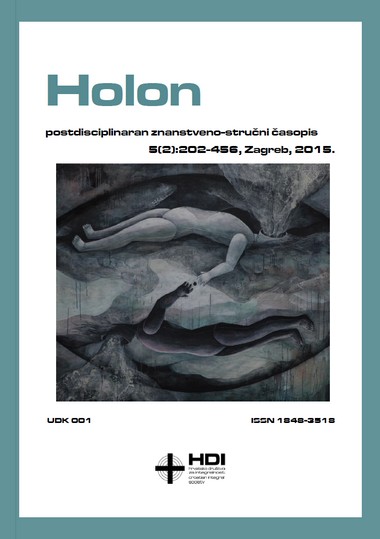
We kindly inform you that, as long as the subject affiliation of our 300.000+ articles is in progress, you might get unsufficient or no results on your third level or second level search. In this case, please broaden your search criteria.

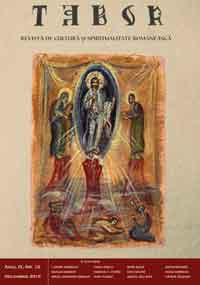
In the 60s, people of a certain age and a certain condition, such as doctors, lawyers, teachers, preservedtheir conduct, language, manners along with some of their habits and tastes. The aestheticthaw of those years was a reality, along with a certain ideological sweetening. Berdyaev was right toclaim that the past always returns, but not as such, but implied in various forms. The article evokessituations, characters and stories that describe the atmosphere of those years in Bucharest.
More...
There are many journals and memoirs published in the quarter century since the collapse of thecommunist regime, some, perhaps the most valuable, written during the dictatorship or in exile, orothers, in the period of freedom that followed. Very few of them bears the signature of priests, andamong the most important of them, are, no doubt, the memories of Father Ion Bria, emblematicfi gure of the Church, titled “The second baptism” and modestly subtitled: “Autobiography”. Thearticle evokes Father Ion Bria and analyzes his volume of memories.
More...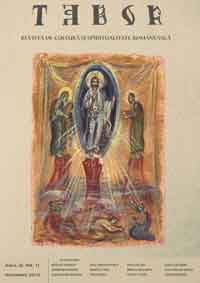
This article represents a review of the volume History of Dacoromanian literature, signed by Professor Mihail Diaconescu. The fundamental idea of the book is that we have a Dacoromanian literature that we need to assume, according to the literary critic Gabriel Ţepelea, who said: “It is therefore necessary a resetting of the Romanian culture on other dimensions by including the Latin writings of Dacian authors, as well as those of foreign tribes who have carried out their activity in Scythia Minor (Dobrogea) in latin, as other literary histories do in the West.” Mihail Diaconescu is the first to create a complex view of the literature in the Dacoroman period, whilst also highlighting “theological and philosophical contributions” worthy of being regarded as “Sources of Romanian philosophy”.
More...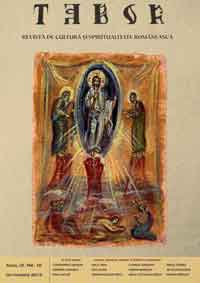
When his volume of (false) memories, Journal en miettes (Journal in crumbs), was published, in 1967, Eugene Ionesco was already a leading figure of the French theater, regarded as a pioneer in drama, having now a lifetime experience, not at all linear, spent between Romania and France, so that his own self introspection was revealing a confused man, concerned about his own destiny. The Journal has numerous pages of genuine memoirs, filled with meditations on the condition, the state of existence and on its final moment, death.
More...
The quarter-century since the collapse of the red dictatorship has not produced grand memoires or journals, but it helped understanding the existing ones, some of them being outstanding literary works, such as those remaining from Argetoianu. I will give three examples (Ion Ioanid, George Jurg- Negrilești and Pericle Martinescu), saying that Steinhardt’s Journal of Happiness is a complex and very special work that surpasses all of them. Of the four authors, Argetoianu and Ion Ioanid wrote - one in the country, one in exile - in conditions of complete freedom. The other two, George Jurg- Negrilești and Pericle Martinescu wrote in times of dictatorship, bith in a more relaxed period, as well as during the Terror. However, a different political climate never affected the quality of the books.
More...
Published in 1997, 40 years after the author’s death, Alice Voinescu’s Journal is part of the personal documents series, impossibly to be published before 1989. Covering 32 years, these notes have multiple value: it is a highly important document due to the historical information included, a mirror of rare intelligence and acute awareness responsive to the world in which she lived, witness of the evolution of personalities such as Gide or Enescu, whose friend she was. Beyond its merits, there is another reason that made us dwell on this journal: next to the personal pages of Jeni Acterian, Martha Bibescu, Florence Albu, Ioana Em. Petrescu, those of Alice Voinescu are representative of feminine diarist writing in our culture, of the way she defines the specific parameters within proximate genus.
More...
One of the few priests, authors of published journals, is Alexander Schmemann, professor of theology from the Russian emigration. Published in English in 2000, his journal covers his last ten years of life, before his premature end in 1983 when he was defeated by cancer. This text explores some of the major themes of the journal: reflecting on the need to write, differentiating between religion and faith, contemporary Orthodoxy and its challenges, but also the author’s deeply human dimension, reflected in his notes.
More...
Ioan Ianolide is known today mainly through his memoirs, “Return to Christ. Document for a New World”, written under Communist persecution, but published in 2006 by the nuns from Diaconești monastery, Bacau County. In our approach, our purpose is not to check what Ianolide wrote in his book, but to know him better in the light of the documents the Security had on him, thereby contributing to shaping his biography and deeds, but also to understanding the spirituality that marked his detention in the prison of Tg. Ocna. While consulting the archives, we see that we are dealing with an eminently political language, aggressive towards Christian spirituality, which was meant to embody the most heinous legionary conspiracies against the communist regime. Security believed that in Tg. Ocna was concealed a Legionary activity of indoctrination and recruitment, so that after their release, the protagonists to strike the foundation of the communist regime. Therefore, the trial in 1959 against the 30 defendants, with Ioan Ianolide and Constantin Voicescu to the fore, as well as other trials from this period, were directed precisely against those who, despite being in a communist prison, had adopted the Christian way of life above all political attitude. In other words, it was a lawsuit against Christian conscience in communist prisons.
More...
Paul Sterian is part of the inter- and post-war intellectuals advocating for raising Romania to the standards of Western countries. As a result, he not only helped to the economic growth of the country (remember that, in The Time of the Burning Bush, André Scrima includes him among our biggest technocrats) but also to developing the sense of observation of the young generation. As proof there are his large articles published in the journals Curentul, Floarea de foc and Credința, between 1928 and 1940. On this occasion, we propose the reading of two articles that, given the period when the author wrote them, deserve to be remembered. Namely, Léon Bloy’s biographical - a name little known today that can be taken as an example by many of us - and Humor of the Saints, a text that highlights again his thorough knowledge of the Patericon teachings.
More...
For many, The Chronicle and the song of the ages studied during middle and high school, remains, after graduation, just a literary work in the compulsory school bibliographies. Read from a historical perspective, this work becomes a genuine source for capturing different experiences, ideas and socio-political views. In the context of the commemoration of the centenary of the World War I, we propose in this study the reintroduction of this work in the historical debate, through capturing the experience of the young Lucian Blaga and some members of his family during the war years and the Great Union, as well and the way these events affected them
More...
The article attempts to find the profound spurs in the autobiographical notes of Mircea Eliade, undoubtedly one of the most prolific authors in Romanian and universal culture. Eliade wrote thousands of pages related to events, landmarks, readings and passions of his own life, from age 13 until the end of his life.
More...
The present article refers to the diary of a Romanian peasant with four primary classes from Monor, Bistrita County. Simion Cismaș is the author of a journal entitled Călindar, where he recorded, for almost 44 years (1937-1981), all the events that have marked his life, both his personal life and that of the community to which he belonged as well as national and world realities and where, by combining the three levels of family, nation and world, he has proven his ability to see the intrinsic link between them. Cismaș Simion’s Journal is a history of the many, forgotten or ignored, a history of Monor and the surrounding villages, presenting the people of Monor, and not only them, as participants in history and as part of it. It has a tremendous documentary value, as part of those fundamental reconstitutions completing the image of an epoch, and as a completion of historical studies, making them more vivid. History comes, thus, from its source, through those who live it and make it.
More...
This text is based on a speech held on April 25, 2105 at the “Babes-Bolyai” University of Cluj- Napoca, on the occasion of the book launch of Cismaș Simion from Monor, Călindar 1937-1981. Călindarul written by Simion Cismaș of Monor fall into what psychologists have called autobiographical memory, because it is the life story of a peasant, a simple man, with four classes, but with a great life experience and a sparkling intelligence. The story covers a long time between 1937-1981, starting at the age of 28, when the author discovers and reconstructs his self. It is a life story presented in the traditional manner, as the forerunners have done often since the eighteenth century, especially the inhabitants of the frontier lands, through short notes on the edges or at the end of religious books, calendars, about special events in their lives or in the village, many of them becoming true chronicles of the village.
More...
This text is based on a speech held on April 25, 2105 at the “Babes-Bolyai” University of Cluj-Napoca, on the occasion of the book launch of Cismaș Simion from Monor, Călindar 1937-1981. However, what this journal shows above all is how a peasant family provides their daily bread in this era of modernization of rural areas, the progress they make, how is this progress affecting, in terms of quantity and quality, the level of their living conditions – food, shelter, clothing – and of their sanitary conditions and health status, as well as the education of children and the general level of culture
More...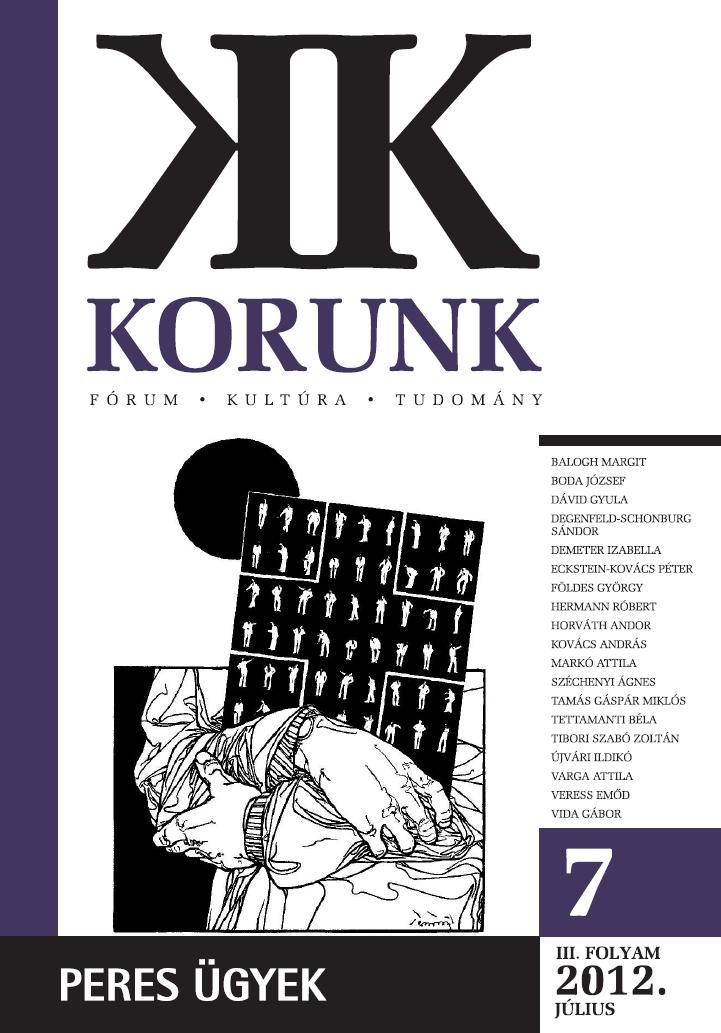
Vida Gábor írásában sok igazság és sok keserûség van. Ez utóbbi is érthetõ, hiszen aki ma a könyvcsinálással bármilyen vonatkozásban kapcsolatban áll, azt egyre inkább elfogja a tehetetlen keserûség. A magunk pászmájáról sok mindennel tudnánk kiegészíteni kritikai észrevételeit. Ezeket az elmúlt években illetékes vagy illetéktelen helyen sokan el is mondtuk, eredménytelenül. Mert bár hangzottak el azok nyomán néha ígéretek illetékes helyekrõl, a lényeget tekintve semmi nem változott.
More...
Talán abból volna jó kiindulni, hogy az elmúlt húsz évben legalább annyi könyv jelent meg Erdélyben, mint az elmúlt ötszáz évben összesen. A számok természetesen, még ha pontosak volnának is, csalnak. Ugyan mi köze van a mai, jövedelemorientált nyomdavállalkozónak Heltai Gáspárhoz vagy Misztótfalusi Kis Miklóshoz? Bizonyos deklarált folytonosságeszményen kívül semmi, a vidéki lakosság közömbös, a politikai elit buta és kapzsi. A nép nem olvas verset, és a politikai elitnek sem a mûveltség és a mértéktartás a fõ ismérve...
More...
Nincs kétségem afelõl, hogy valamennyi- ünket, akik most itt, Mátyás királyunk szü- lõháza tövében összegyûltünk, a könyv kö- rül fodrozódó gondolataink valamelyik foszlánya serkentett idejövetelre. A könyv õsforrása az emberi közlésvágy, avagy a közlési kényszer. A kényszer nem minden esetben sátáni eredetû, lehet biológiai fogantatású, megjelenhet égi sugallatra is. Már világra jöttünkkor sírva panaszoljuk, hogy az anyatest kellemes melegét felváltani kényszerültünk az univerzum kellemetlen hidegségével. S telt az idõ – emberi fajtánk eseté- ben évezredek vagy milliók múltával – hangszalagunk síró rezgése szavak formálá- sára bizonyult alkalmasnak, s ugyancsak ezer esztendõk kellettek ahhoz, hogy a füllel felfogható hangból, szemmel látható jel, betû szülessen meg.
More...
Kassel, 2012. június 22. Német–görög elõdöntõ. Már a meccs elõtt népünnepély az utcákon, közben és utána pedig rendõri és mentõszirénával tarkított városbuli. Az általános örömmámor visszatérõ szlogenje a Deutschland! felkiáltás, autóból, utcasarkokról, füstmentes kocsmákból és hûvös teraszokról a legkülönfélébb kiejtésben hallható: Dájcslánd, Ducsland, Tojcsland! Hochdeutsch kizárva. Olyan az egész, mintha az egész a teljes városra kiterjesztett performansz lenne, és ha nem volnánk biztosak benne, hogy Németország minden vá- rosában hasonló esmények zajlanak, talán még a dOCUMENTA 13 katalógusát is elõ- kapnánk, hogy megnézzük, vajon nem Carolyn Christov-Bakargiev, a kiállítás kurá- tora rendelte-e a bulit mondjuk valami posztkoloniális mûvészeti aktusként. Vagy annak a kritikájaként.
More...